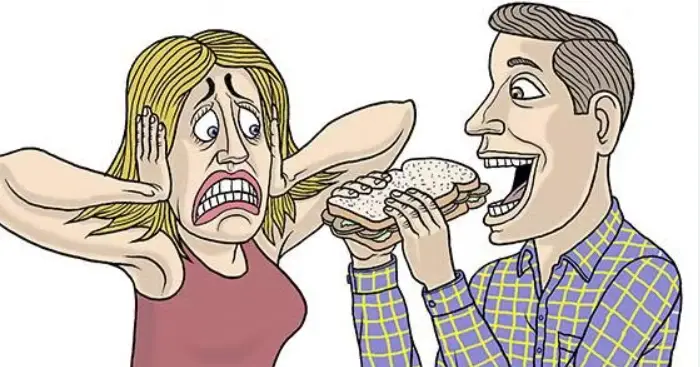According to a study conducted by a team from Newcastle University in the United Kingdom, people who experience intense negative reactions to certain sounds, like loud chewing, pen clicking or knuckle cracking, are not just being irrational. The study showed that the brains of people who experience these reactions, known as misophonia, actually go into overdrive in response to these triggers.
The study used MRI scans to observe the brains of 44 participants, roughly half of whom had misophonia, as they listened to various sounds, including neutral sounds like rain and boiling water, unpleasant sounds like screaming or crying, and trigger sounds like breathing or eating. The MRI scans showed that people with misophonia have an abnormality in their emotional control systems, which leads to a heightened response after hearing trigger sounds. These trigger sounds also produce physical responses like increased heart rate and sweating.
Not only did the researchers observe abnormal connections in the brains of those with misophonia, but they also found greater amounts of myelination, which is the brain’s insulation, in these individuals. This indicates a physical difference in the brains of people with misophonia.
This finding is important for those who struggle with misophonia and whose friends and family may not understand the severity of their reactions. Dr. Sukhbinder Kumar, who led the research, said in a statement that “for many people with misophonia, this will come as welcome news as for the first time we have demonstrated a difference in brain structure and function in sufferers.” He also stated that despite the strikingly similar clinical features of patients with misophonia, the disorder is not recognized in any of the current clinical diagnostic schemes. This study serves as further evidence to convince a skeptical medical community that misophonia is a genuine disorder.
The team believes that additional research could lead to treatments that allow people to self-regulate their reactions. Understanding the physical differences in the brains of people with misophonia is a crucial step towards developing effective treatments for this disorder.
One potential treatment that has shown promise is cognitive-behavioral therapy (CBT). CBT is a type of talk therapy that helps people change negative patterns of thinking and behavior. For people with misophonia, CBT can help them reframe their thoughts and emotions about trigger sounds, and learn coping mechanisms to manage their reactions.
Another potential treatment is sound therapy, which involves exposing people to trigger sounds in a controlled environment while providing relaxation techniques to help them manage their reactions. The goal of sound therapy is to gradually decrease the intensity of the person’s reactions over time.
While misophonia is not yet recognized as a disorder by most medical professionals, this study provides important evidence that the disorder is genuine and that people with misophonia experience physical differences in their brains. This finding could lead to more effective treatments and greater understanding and acceptance of misophonia as a real disorder.
How To Overcome Misophonia
Misophonia is a disorder that can greatly affect a person’s daily life. However, there are ways to manage and even overcome the symptoms of misophonia.
One method is through cognitive-behavioral therapy (CBT), which can help individuals learn how to change their thought patterns and emotional responses to trigger sounds. This therapy can also teach coping strategies, such as relaxation techniques and distraction techniques, that can be used when faced with trigger sounds.
Another approach is sound therapy, which involves exposing individuals to trigger sounds at low volumes and gradually increasing the volume over time. This can help desensitize the individual to the trigger sounds and reduce their negative emotional response.
In addition, lifestyle changes can also be beneficial in managing misophonia symptoms. This can include avoiding trigger sounds as much as possible, using earplugs or headphones to block out trigger sounds, and practicing stress-reducing activities like yoga stretching or meditation. Prayer and reflection into your life is helpful as well.
It’s important to remember that overcoming misophonia is a process and may take time and effort. Seeking the help of a mental health professional, such as a therapist or psychiatrist, can be a helpful step in managing the disorder.
Overall, with the right approach and support, individuals with misophonia can learn to manage and even overcome their symptoms, improving their quality of life and reducing the impact of trigger sounds on their daily functioning.
Recommended Reading:





